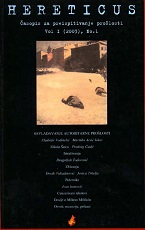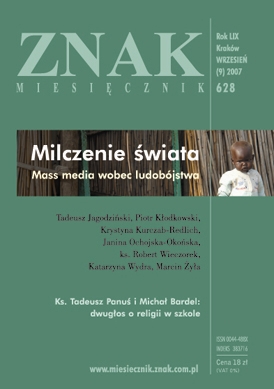
We kindly inform you that, as long as the subject affiliation of our 300.000+ articles is in progress, you might get unsufficient or no results on your third level or second level search. In this case, please broaden your search criteria.



The text deals with the issue of court prohibitions of works of art in communist Serbia. The author shows the synchronised participation of politics, judiciary, estetic and artistic critics and journalists in these prohibitions, supported by other segments of the society. After considering the methods used by the regime in pursuit against artists and when prohibiting works of art, the author analyses a phenomenon specific of communist Serbia - fake dissidents. The communist regime had created and financed its, naturally, false enemies, in order to prevent the existance and uniting of true opposition. In the end, the text deals with self-censorship, as a specific form of surpressing artistic freedoms.
More...
Analysing, from the standpoint of legal overcoming of the past, both the actions of the new government undertaken in the first year after October 2000, and the things this government has not initiated or even announced, one does not get the impression that such actions and failures to act are based on a well-perceived and rounded concept of policy regarding the legal overcoming of the past, whether such policy be to forget or to remember. At any rate, no such concept has been made public, and hence the way in which the government had (if so!) set the course between the „Scylla of memory and Charybdis of oblivion" is a not a public matter. Members of the present government have failed to announce an overall legal overcoming of the past in the above-mentioned published programme from the opposition phase before October 2000. What happened then - a combination of armed peoples' revolution and some elements of coupe d'etat (arrangements with important members of police and armed forces), its second part in particular, contributes to certain inconsistencies and the porous nature of the subsequent policy towards the past.
More...

In his paper, the author critically considers the intentions of Dobrica Ćosić to provide, in direct contact with the Slovenians, their support or at least implicit consent to his plan for the resolution of crisis in post-Tito Yugoslavia, with special emphasis on the final resolution of the Serbian national issue. The author analyses the text of SASA Memorandum, its formulation, its contents, its presentation to the public, as well as the role of Ćosić in its idea, formulation, contents and publication. The author concludes that „Ćosić's Slovenian adventure" in mid-80s did not result in Slovenian support for Serbian opinion regarding Kosovo, for the change of 1974 Constitution and for the idea of Yugoslavism. Slovenians expressed their attitudes and reasons for not being able to accept Ćosić's proposals and concepts openly, precisely and with sound arguments.
More...



Jovica Trkulja: Legal Overcoming of Authoritarian Past (Rechtsbeugung) (Vladimir V. Vodinelic, Тhе Past as а Challenge to Law, Belgrade, 2002) Nikola Šuica: Field of Actions (Concerning the exibition "Central-European Aspects of Vojvodinian Avant-gardes 1920-2000: Border Рhenomenа, Рhenomenа of Borders") Dragoljub Todorovic: Book оn the Delict of Thought (Rajko Danilović, Use of Enemy, Belgrade, 2002) Wickedness - Оnе of Seven Deadly Sins
More...
The author writes about one of the most tragic divisions in the Serbian people - that into partizans and chetniks, the civil and the communist option, and, with sound arguments, shows that this division is not yet overcome. The author shows that the misrepresentation of Draža Mihailović and chetniks as traitors and criminals is still at hand. Analysing the text published in the Danas paper, as well as attitudes of Todor Kuljić, Desimir Tošić, Dobrica Ćosić, Miloš Mišović and other authors, Ivanović concludes that even today, when it comes to the civil war in Serbia and the activities of the chetnik movement, the communist option is predominant. The author shows that the political option represented by the chetniks was, as opposed to the communist one, pro-European and democratic, therefore, just as the one the present democratic Serbia is fighting for. The main message of the text is that without reassessment and reevaluation of the past there can be no national reconciliation, and without it, there can be no true democracy in Serbia.
More...
In this paper, the author asks how is it possible to find the way out for the culture of a nation, the exit from authoritarian society that has only just embarked upon transition towards a modern democratic society with the same people. The author reminds of ten years of populism in Serbia, in all areas, including culture, where the most eminent artists dealt solely with national issues in an unpermissably wrong manner. This is why the author problematises the issue of new organisation of all social segments, since the entire Serbian society has been placed before the temptation of new valuation, liberation of culture from the constrictions of foul regimes and finding of its own identity.
More...




The text is devoted to the universality of literature.
More...

